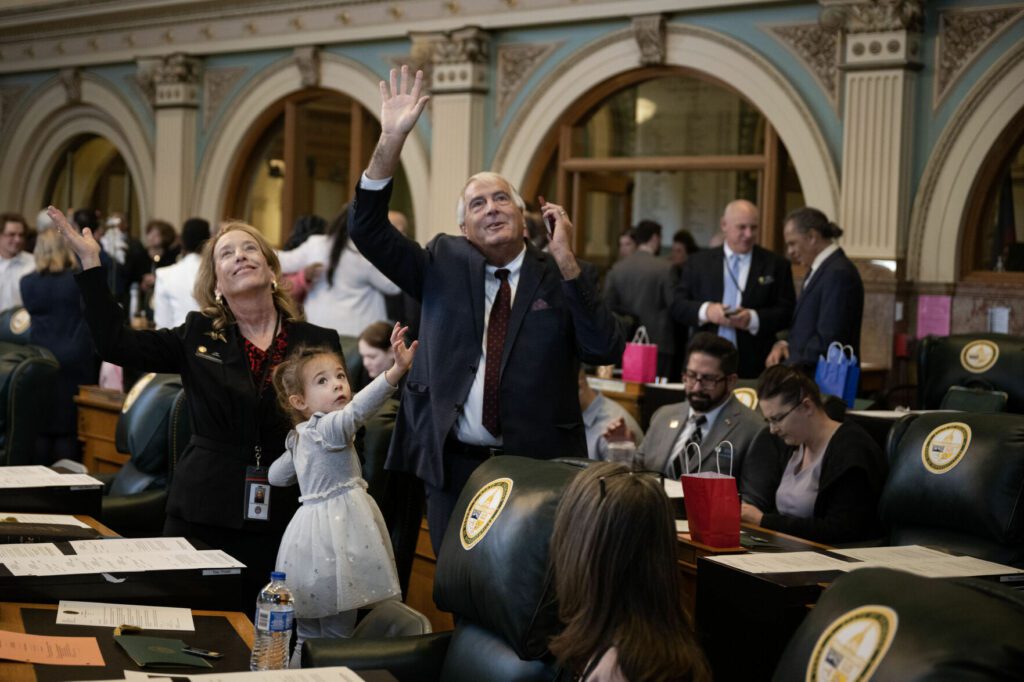Colorado officials call for state response to fentanyl-fueled overdose crisis

Led by Attorney General Phil Weiser and two state senators, a coalition of Colorado officials publicly called for a statewide response to the deadly surge of fentanyl, which has fueled a fatal overdose crisis that is projected to set another record this year.
“Fentanyl is killing our kids,” Brian Mason, the district attorney for the judicial district covering Broomfield and Adams counties, said at a Thursday news conference. “This is not a partisan issue. This is public safety issue, and most importantly, it’s a public health issue.”
The group, which includes law enforcement officials and two other district attorneys, said the state needs a unified response that focuses on thorough investigations of every fentanyl death, improved treatment options and tougher penalties for people convicted of possessing fentanyl, a synthetic opioid.
State senators Brittany Pettersen and Kevin Priola both pledged to address those priorities in the upcoming legislative session and take aim at drug cartels, the primary suppliers of the drug on the black market.
More than 1,800 Coloradans are projected to fatally overdose in 2021, officials said this week, an increase of at least 22% from last year’s total and potentially doubling the death toll from 2018. Fentanyl has played a role in more deaths this year than ever before, even though four months of 2021 data has yet to be fully analyzed by the state.
In the wake of years of regulatory crackdowns after the initial waves of the opioid epidemic, illicit fentanyl – its ingredients shipped from China and synthesized by Mexican cartels – has played an increasingly prominent role in the illicit drug market. Fentanyl is now frequently found in heroin, meth and cocaine, as well as seemingly legitimate opioids and Xanax tablets.
Priola said 60% of illegal drugs confiscated in Colorado have contained fentanyl. Douglas County Sheriff Tony Spurlock said his county has had a 30% increase in fentanyl drug overdoses. His agency’s drug task force has seized more than 367,000 “dosage units” of fentanyl in the past 12 months.
Priola and Pettersen both called for public education campaigns to raise awareness among young people of the dangers of taking pills, a position supported by Lisa Raville, whose Harm Reduction Action Center in Denver supplies clean needles and fentanyl test strips to anyone who wants them. Many people who overdose as a result of fentanyl, officials said Thursday, have no idea they’ve taken it. The drug’s broad availability and low price have made it ubiquitous.
Braden Burks thought he was taking a painkiller in January 2019, his mother, Tami Gottsegen, told reporters Thursday. Braden had trouble sleeping and had purchased a pill that had been pressed to look like a 30-milligram oxycodone tablet. The illicit pill contained a lethal dose of fentanyl, and Braden died in his sleep.
“They don’t have a chance to learn from their mistakes. They die from their mistakes,” she said, noting one pill is enough to kill.
“Anyone selling drugs should assume that the drugs contain fentanyl, and there’s a very good chance that someone will die,” she added.
Weiser said state lawmakers should make it a felony-level offense to possess 4 grams or more of fentanyl. Lawmakers had previously decided to make that level of possession – for any drug – a misdemeanor.
“Four grams of fentanyl is not like 4 grams of cocaine,” Weiser said at Thursday’s news conference. “When someone has 4 grams of fentanyl, that is enough to kill thousands of people.”
Michael Dougherty, the district attorney in Boulder County, agreed. He said the state needed “stiffer penalties” for drug distributors and that “we should go hard after the people who are preying on those in crisis.”
But in an email to The Denver Gazette after the news conference, Raville urged caution and instead advocated for “robust public health measures” to address the crisis. She warned that many people don’t know what’s in the substances they purchase or sell on the street, and that the lines between buyer and seller are often blurred.
“We agree this is a public health emergency, yet we demand a public health approach,” she said. “Criminalization only increases overdose deaths. Five decades of data support that assertion.”
She advocated for increased distribution of Narcan, used to reverse opioid overdoses, and fentanyl test strips, which can detect whether a substance contains fentanyl. She said she supported the use of federal stimulus money – millions of dollars of which flowed during the pandemic – to support treatment services.
Roughly $400 million is also set to come to Colorado in the next 18 years – thanks to recent settlements with opioid companies, money that will be divided up across the state to battle the crisis.
Pettersen, a Democrat representing Jefferson County, told reporters at the news conference that the United States is in its worst-ever overdose crisis and blamed it on decades of failed policy. She said a “piece of this puzzle is going after the drug cartels.” She said she plans to work with Weiser and other officials on a grant program to bolster law enforcement resources and spur collaboration between agencies.
“They don’t have the resources to actually dedicate to investigate these deaths because they’re happening at such a high rate,” she said, “and to prosecute the people who are responsible, and ultimately share that information across Colorado … and also to coordinate with state and federal agencies.”
She indicated, too, that she is working on legislation to “go after the cartels that are devastating this state.” Priola also referenced specific legislation to “disrupt supply chains and dismantle drug networks,” among other interventions at the production level.
Emails sent to both of their offices seeking specific information about those legislative goals were not returned Thursday.













